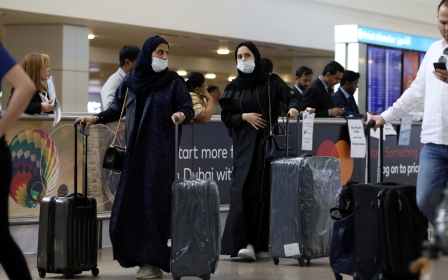Arabic press review: Saudi Arabia plans new militia in Syria

Saudi Arabia to form militia in Syria
Saudi and US officials recently held talks regarding Riyadh’s plans to establish a US-backed Arab force in Syria, Arabi21 news site reported.
In an interview with Arabi21, local sources in Syria said a meeting was held in the Syrian city of Hassakeh with the aim of forming a militia belonging to the Kurdish-led Syrian Democratic Forces (SDF), under the pretext of "resisting Iran’s expansion attempts in northeastern Syria".
They also said that the Saudi delegation agreed to finance and train what is to be known as the Arab al-Sanadid Forces militia, in addition to supporting and training Al-Nukhbat Brigade, military forces affiliated with Syria's Tomorrow Movement.
The sources did not reveal the names of the Saudi figures participating in the meeting.
New MEE newsletter: Jerusalem Dispatch
Sign up to get the latest insights and analysis on Israel-Palestine, alongside Turkey Unpacked and other MEE newsletters
According to Ibrahim al-Habash, director of Al-Khabour news site, a US security company would train the Arab forces, and young men would be encouraged to join to help boost membership.
"The Saudi support is considered a support for the SDF, under the guise of fighting Iranian influence," said Habash.
Yemeni students stranded in coronovirus city
Yemen's government is making arrangements to evacuate some 170 Yemeni students stranded in Wuhan, capital of China’s Hubei province and the epicentre of the coronavirus outbreak, a government source told London-based newspaper al-Araby al-Jadeed.
The source, who spoke on condition of anonymity because he was not authorised to make statements to the media, said a high-level committee was to meet and approve measures needed to evacuate the students and pay for their financial dues.
The government was coordinating with the Chinese foreign ministry and the staff at the Yemeni embassy “to evacuate students to Beijing, or any other safe city, as a first step”, the source added.
A group of Yemeni students studying in China on scholarships had called upon their government and embassy in Beijing to help with their evacuation.
Fahd al-Tawili, a Yemeni studying at a university located in Wuhan, said that some 170 Yemeni students there were in a state of panic as they had been unable to leave their dorms for fear of getting infected by the virus.
Last week, the first coronavirus case in the Middle East was diagnosed in the United Arab Emirates. The UAE health ministry said a family from Wuhan had been been diagnosed while staying in the country.
So far, the virus has led to more than 360 deaths in China, with some 17,000 cases confirmed cases. Outside of China, the virus is blamed for one death - in the Philippines - and more than 150 confirmed cases around the world.
On 30 January, the World Health Organisation (WHO) declared a global health emergency over the new virus.
Jordanian's dinner with Israeli official leads to purge
A Jordanian clan disavowed one of its members after he invited the Israeli ambassador in Amman, Daniel Nevo, to the dinner table, according to The New Khalij website.
The Rusan clan in northern Jordan said that the person who issued the invitation was no longer a member. It also apologised “to the Palestinian and Jordanian people” for the incident.
"According to the customs of the tribes, their traditions and laws, the Rusan clan bears the mistake made by the inviter who welcomed the Israeli ambassador to dinner at his home, without the clan's knowledge or the consultation of any of its members," it stated.
Last month, hundreds of Jordanians demonstrated against the pumping of Israeli gas into the kingdom, which began at the start of January.
Inflamed by Israeli leaders’ statements that they would annex the occupied Palestinian Jordan Valley following the upcoming election in March, the protesters also called on the government not only to cancel the gas deal but also Jordan's peace treaty with Israel.
The treaty was signed in October 1994 by the prime ministers of Israel and Jordan with the backing of the late King Hussein of Jordan.
* Arabic press review is a digest of reports that are not independently verified as accurate by Middle East Eye.
Middle East Eye delivers independent and unrivalled coverage and analysis of the Middle East, North Africa and beyond. To learn more about republishing this content and the associated fees, please fill out this form. More about MEE can be found here.




